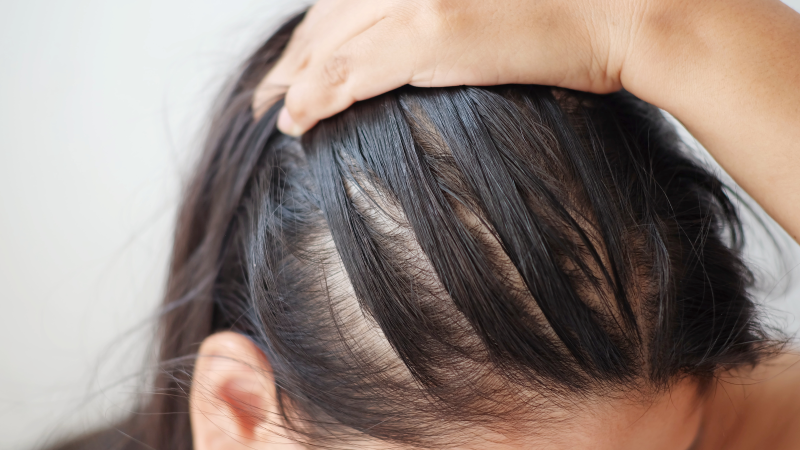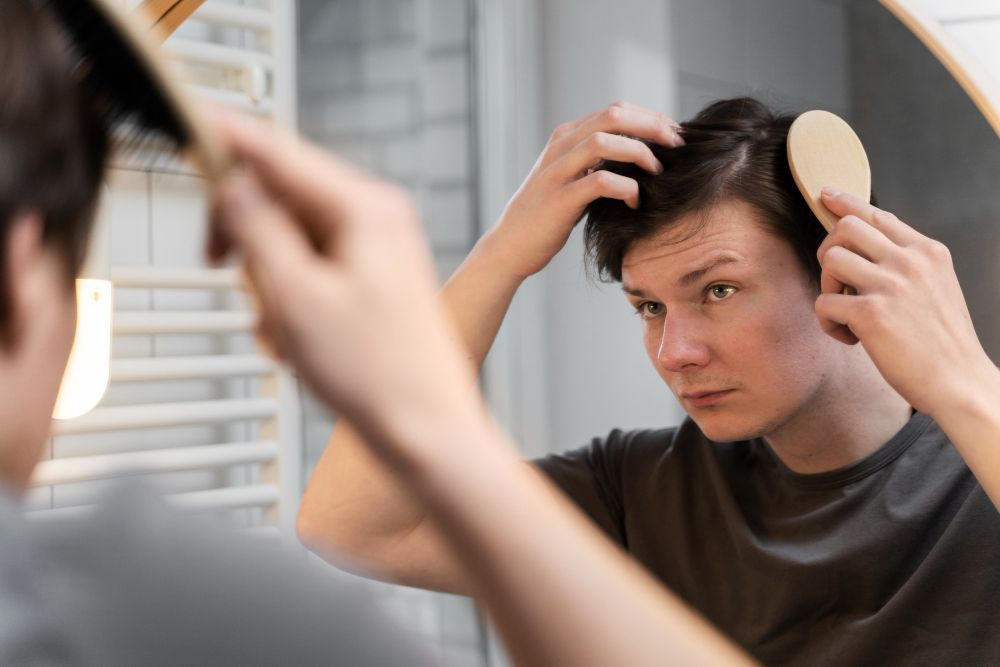Can a Doctor Prescribe Finasteride?
Can a Doctor Prescribe Finasteride?
Finasteride has gained attention in the realm of hair loss solutions, prompting many to ask, "can a doctor prescribe finasteride?" Does finasteride make hair thicker? As a prescription medication, finasteride has both proponents and skeptics. In Rhode Island, Scalpmasters strives to educate patients about this option. You can make informed decisions about finasteride baldness treatment by understanding its intricacies. Take a look at a few important points below, and do not hesitate to reach out to us to schedule a consultation.

What is Finasteride?
Finasteride is a prescription medication primarily known for treating androgenetic alopecia, commonly referred to as male pattern baldness. It belongs to a class of drugs known as 5-alpha reductase inhibitors.
While many wonder, "can doctors prescribe finasteride for hair loss?", it's noteworthy that it was initially developed for enlarged prostate treatment. Over time, its effectiveness for hair regrowth increased, leading to its popularity in the hair loss sector.
The Science Behind Finasteride
Is finasteride worth it? Finasteride works by inhibiting the 5-alpha reductase enzyme, responsible for converting testosterone into DHT (dihydrotestosterone). Elevated DHT levels are linked to hair follicle shrinkage, which eventually leads to hair loss. By reducing DHT in the scalp, finasteride stimulates hair regrowth and slows the hair loss process. For many, the finasteride effect on hair has been transformational, restoring not just hair but also self-confidence.
Primary Uses of Finasteride
Apart from hair loss, finasteride was originally designed to treat benign prostatic hyperplasia, commonly known as an enlarged prostate. The finasteride's ability to manage DHT levels benefits both hair loss and prostate enlargement. Over the years, its reputation for addressing baldness has overshadowed its initial purpose. Today, when people ponder "finasteride for hair?" it comes to mind quickly. Does finasteride thicken hair? It can for some, but you should reach out to your doctor to learn more.
History and Development of Finasteride
Finasteride's journey began as a treatment for enlarged prostate conditions. The observation of hair regrowth in patients was an incidental but groundbreaking discovery.
This led to further research, culminating in its FDA approval for hair loss in 1997. Since then, the narrative around "hair loss finasteride" has been growing, with many considering it a staple in baldness treatment.
How Finasteride Works to Prevent Hair Loss
Finasteride operates at a hormonal level, targeting the root causes of androgenetic alopecia. By curbing DHT production, it prevents hair follicles from shrinking, promoting healthier hair growth. As a result, many users have reported that finasteride does make hair thicker and more robust. Furthermore, consistent use can lead to a halt in hair loss progression and even stimulate regrowth in previously dormant follicles.
Benefits of Finasteride for Hair Loss
- Stimulates Hair Regrowth: Many users have observed noticeable hair regrowth after consistent finasteride use.
- Slows Hair Loss: By targeting DHT, finasteride can halt or significantly slow hair loss progression.
- Thickens Hair: Questions like "will finasteride thicken hair?" are common. Some people report denser, healthier hair.
- Cost-Effective: Compared to some treatments, finasteride can be a more affordable long-term solution.
- Easy Administration: As an oral medication, incorporating finasteride into daily routines is seamless.
Potential Side Effects and Concerns
While many see positive finasteride results, it's essential to be aware of potential side effects. Some men experience sexual dysfunction, including reduced libido, erectile dysfunction, or decreased semen volume. It's crucial to call your doctor if these or other symptoms persist. Some of the most common side effects include:
Short-Term Side Effects
- Allergic reactions: Symptoms like rash, itching, and swelling should prompt users to stop taking finasteride and consult a doctor.
- Dizziness or weakness: Some users report feeling faint or weak during the initial days of the medication.
- Water retention: Minor swelling in the hands or feet is a possible side effect.
- Decreased libido: Some men notice a temporary reduction in sexual desire.
- Headaches: This is a less common side effect but worth noting.
Long-Term Implications
- Depression: Prolonged use might be linked to mood changes, though concrete evidence is limited.
- Breast tenderness or enlargement: It's crucial to report any changes in breast tissue to a healthcare provider.
- Testicular pain: Though rare, some men report testicular discomfort.
- Issues with ejaculation: This includes decreased volume or challenges with ejaculation.
- Potential fertility challenges: Some reports suggest potential fertility issues, though findings are inconclusive.
Addressing Common Fears and Myths
It's easy to stumble upon myths and misconceptions about finasteride. Common fears, like irreversible side effects, often lack a strong scientific basis. If they occur, most side effects are temporary and cease after discontinuing the medication. It's always essential to differentiate between anecdotal experiences and evidence-based facts when considering finasteride for hair loss.
Finasteride Dosage and Administration
Typically, finasteride is prescribed as a 1mg daily tablet for hair loss. Consistency is key, as sporadic use can limit its effectiveness. Always follow the prescribed dose, and remember that altering it without a doctor's advice isn't recommended. Do not change your dose of finasteride without reaching out to your doctor first.
Comparing Finasteride to Other Hair Loss Treatments
When exploring hair loss solutions, finasteride is one of several options available. While its oral administration is a plus for many, others might prefer topical solutions or shampoos. It's also worth considering newer treatments like Scalp Micropigmentation (SMP), which offers a different approach. Ultimately, the best treatment is one tailored to an individual's needs, preferences, and medical history.
The Benefits of Scalp Micropigmentation for Hair Loss
- Immediate Results: Unlike treatments that require time, SMP offers instant visual results.
- Non-Invasive: SMP is a non-surgical option, reducing potential complications and recovery time.
- Long-Lasting: With proper care, SMP can last several years before needing a touch-up.
- Natural Appearance: Skilled practitioners ensure that SMP blends seamlessly with existing hair, offering a realistic look.
- Suitable for All: Regardless of hair loss stage or type, SMP is adaptable, catering to diverse needs.
- Boosts Confidence: By addressing hair loss, SMP can significantly enhance self-esteem and confidence.
- Cost-Effective: Over time, SMP can prove more economical than some ongoing treatments.
A Doctor May Recommend Finasteride With Other Treatment Options
When considering hair loss interventions, doctors often suggest a multifaceted approach. While finasteride can be effective on its own, combining it with other treatments might optimize results. Whether it's integrating finasteride with hair growth shampoos, laser therapies, or innovative solutions like SMP, a holistic plan can yield the best outcomes. Always discuss potential combinations with healthcare professionals to ensure safety and compatibility.
Contact Scalpmasters of Rhode Island for the Top SMP Treatment Choices
The world of hair loss treatments, encompassing finasteride and SMP, is ever-evolving. As research progresses, we'll undoubtedly witness more innovations, refined methodologies, and improved results.
Scalpmasters of Rhode Island remains committed to staying at the forefront of these advancements. For anyone navigating the complexities of hair loss, we offer guidance, expertise, and state-of-the-art solutions tailored to individual needs. Contact us today to see if SMP is right for your needs.
Learn More
GET A FREE CONSULTATION
SMP Women Page Form
We will get back to you as soon as possible.
Please try again later.
What's New
Latest Hair Loss Solutions & Guides




Michael Misurelli, the founder has over 25 years of experience working as a licensed barber and is both certified and experienced to perform and perfect Scalp Micropigmentation.
Contact Information
Mon - Sun: 9:00am - 7:00pm
845 Oaklawn Ave Unit 103, Cranston, RI 02920
Resources
Recent Posts By Scalpmasters


All Rights Reserved | Scalpmasters RI.